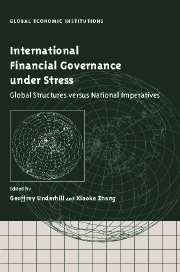Book contents
- Frontmatter
- Contents
- List of figures
- List of tables
- List of contributors
- Acknowledgements
- Introduction: global market integration, financial crises and policy imperatives
- I Financial globalisation and policy responses: concepts and arguments
- II Globalisation, financial crises and national experiences
- 5 Crisis consequences: lessons from Thailand
- 6 The politics of financial reform: recapitalising Indonesia's banks
- 7 South Korea and the Asian crisis: the impact of the democratic deficit and OECD accession
- 8 Currency crises in Russia and other transition economies
- 9 Capital account convertibility and the national interest: has India got it right?
- 10 Learning to live without the Plan: financial reform in China
- 11 The Asian financial crisis and Japanese policy reactions
- III Private interests, private–public interactions and financial policy
- IV Building the new financial architecture: norms, institutions and governance
- Conclusion: towards the good governance of the international financial system
- Index
11 - The Asian financial crisis and Japanese policy reactions
Published online by Cambridge University Press: 22 September 2009
- Frontmatter
- Contents
- List of figures
- List of tables
- List of contributors
- Acknowledgements
- Introduction: global market integration, financial crises and policy imperatives
- I Financial globalisation and policy responses: concepts and arguments
- II Globalisation, financial crises and national experiences
- 5 Crisis consequences: lessons from Thailand
- 6 The politics of financial reform: recapitalising Indonesia's banks
- 7 South Korea and the Asian crisis: the impact of the democratic deficit and OECD accession
- 8 Currency crises in Russia and other transition economies
- 9 Capital account convertibility and the national interest: has India got it right?
- 10 Learning to live without the Plan: financial reform in China
- 11 The Asian financial crisis and Japanese policy reactions
- III Private interests, private–public interactions and financial policy
- IV Building the new financial architecture: norms, institutions and governance
- Conclusion: towards the good governance of the international financial system
- Index
Summary
Robert Rubin, the US Treasury Secretary, was reported to have bluntly criticised Japan for lacking a sense of urgency after his meeting with Kiichi Miyazawa, the Japanese Finance Minister, in September 1998. In fact, the US–Japan dialogue on economic issues was highly acrimonious in early 1998, and American media were fraught with comments that ridiculed Japanese economic policy. In essence, they grumbled that the Japanese government was pursuing fiscal retrenchment and did nothing to rescue troubled banks, while the Japanese economy came under deflationary pressure and neighbouring countries were in the thick of the financial crisis. In view of the fact that the same media had, just four to five years before, described Japan as an invincible economic giant that even threatened the American economic supremacy, it is hard to believe that they were referring to the same economy.
In fact, the Japanese government was far from inactive during the Asian crisis. It made the largest financial contribution, organised a rescue package and even proposed a new regional mechanism for financial co-operation. Thus, it was surprising the United States, which was even unwilling to appropriate money for IMF resources through a quota increase, should criticise Japan. But Japan's international efforts were hampered by its poor economic performance. It had its own financial crisis at home, and was thus unable to help the crisis-stricken economies by absorbing more of their exports. It was well known that the Japanese financial system became increasingly fragile under the heavy load of bad loans.
- Type
- Chapter
- Information
- International Financial Governance under StressGlobal Structures versus National Imperatives, pp. 223 - 240Publisher: Cambridge University PressPrint publication year: 2003
- 1
- Cited by



